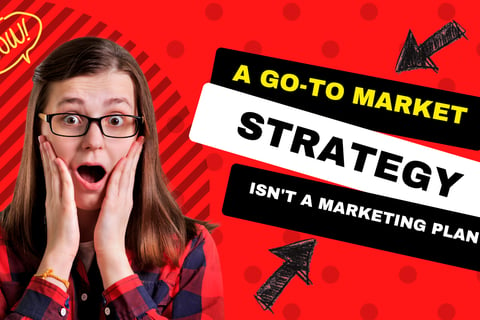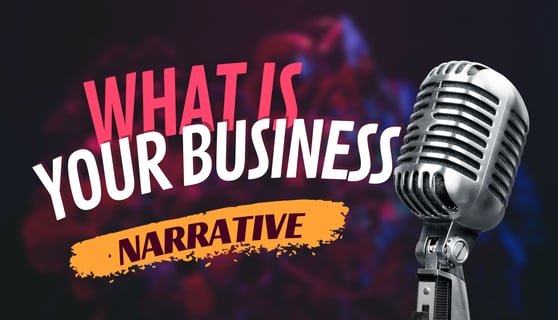How to go to market: Understanding what is GO TO MARKET Strategy For Tech Startups & Consulting Firms
Do you know what is GO TO MARKET strategy? Making your brand, your company and services known to the public calls for a plan and strategy of how you will make people know about your presence. If you are in a startup mode and starting up a new business then you have to come up with your own marketing strategy that will drive business awareness in the public. It involves the use of different online channels and meeting new people who will become part of your network in the long run. It is important to understand go to market when you are in the position of marketing a product or service for a business, what things do you need to consider? And how do you go about doing it? Customer acquisition will be one of the most important considerations in a brand-new business. Without customers, there is no future. It's absolutely that simple.
BLOG
Gone are the days of “this is our end game, let's go out and try to sell as many copies as possible.” Today, a more digital-oriented world has shifted the focus from making a profit to keeping a profit. Businesses still want to sell more and make more, but they want to do it by leveraging their most important asset in the business adequately and efficiently. There are few skills in the world that can be as useful to a marketing professional as the ability to understand, articulate, and execute a successful go-to-market (GTM) strategy. A GTM strategy for a tech start-up can determine how successful you are with getting customers, and can make or break your next fundraising if you are ventured back. The core fundamental of GTM is when it comes to introducing your business to your future customers, what strategy do you take? When we look at go-to-market strategies, there are various channels a business can select. These channels then determine the product that is going to be built, and the metrics that are required to achieve success. There are also other factors that are essential for a company to succeed. Now if you are a bootstrapped SAAS startup or a consultancy, it definitely translates to a healthy P&L statement, that will have you smiling all the way to the bank. Whether you're a SAAS startup, a Fintech, a scaleup, or a consultancy — if your business is ever going to succeed, you need to understand how it will be profitable and revenue generation is at the core of that equation.
Today, we are exploring Go To Market strategy. We are starting with understanding the essence of the GO TO MARKET strategy, and certain fundamentals of going to market that founders should be aware of. s a marketing consultancy, we often encounter 2 sets of businesses that want to work with us. The first one is those that understand that they are tech geniuses or experts in their own rights, but would instead leave the marketing to people who understand marketing, and they want to get it right the first time. The second set is the founders that are geniuses and experts that attempted to launch without either investing in marketing adequately, or learning from those that could help them, and the market ate them up for supper, and spit them out dry. No shade, these are often the founders and experts who think to themselves,I can just turn on ads, and voila! Like magic: Clients a go go ( A go go, west African french slang that simply translates as in abundance)
Needless to say, a few thousand dollars down the drain later, the latter group is left frustrated, disappointed, and having made platforms a bit richer than their own company. They soon realize that they need a better marketing strategy than what they currently are doing I recently was talking with a disruptive fintech founder that we will be working with, and his words struck a cord, paraphrasing here, he said that he had looked at companies that were in his market segment, and though on paper they had done good, they had gotten the users to satisfy investors, the companies were not profitable, and he didn’t want to be in the same boat. This unfortunately is quite prominent with venture-backed companies, in one of Techcabal's newsletters, they shared the news of Lipa Later is set to acquire Kenyan e-commerce startup Sky.Garden.Five-year-old Sky. Garden has raised a total of $5.2 million from venture capitalists but was going to shut down because it couldn’t raise more funding to support its business model. This acquisition by Lipa Later will keep its doors open for longer. This kind of news isn’t all too uncommon because of the wrong focus by companies. Profit is king, something that tends to be forgotten by many founders.
As I was mentally pondering on the subject, I realized that often can be laid at the foot of a misconception of what strategy is, and in this context, what fundamentally is a go-to-market strategy. A marketing strategy is not strategic planning for marketing. Hear me out and allow me to land with my argument. This is often what I have found myself having to explain to prospects and clients alike. More often than not, these 2 are used interchangeably even though they are far from being the same. Strategic planning has nothing to do with strategy, it is simply a set of tasks and activities the company says it will do. For example, we are going to launch our MVP in Q2, We are going to launch a new service at the end of Q1. On the other hand, a strategy is a holistic set of choices and moves a company owes to make that will position it in its industry in a manner that allows them to win. In the go-to-market STRATEGY context, it is not only about executing paid ads, creating content, and leveraging PR. It is an integrative motion. What do I mean? Strategy is based on the Why. Why should we execute in this manner, here is how we are going to do it so we are better than everybody else at serving the addressable market. Think of business strategy as you would of a chess game, a soccer game, or a war plan. At a glance, they seem like they have nothing in common, but at the core, solid strategies in all those arenas are built from the same principles. A strategy is based on a theory that is doable and can be harmoniously translated into actions that are achievable: Tactics.
A strategy is focused on the outcome of the company’s vision, and tactics are focused on the activities to put together to get to the goals that will ensure that the strategy is executed effectively. This is why as a company looking to engage an agency, you owe to be cognizant of this fact. There are agencies that are tactical and execute the plan, and there are agencies that are strategic, they devise the strategy that needs execution, and then you have us, we play in both fields. Hence why we prefer to refer to ourselves as full house consultancy and agency. Now that we have laid down the first brick in understanding strategy in its entirety, let’s establish the fundamentals of go-to-market strategy. A go-to-market strategy focuses on bringing to the market a product or service by communicating to the ICP the value and benefits that this brings to them. The difference between a go-to-market strategy to a traditional marketing strategy is that the former has a core focus on driving revenue. Now, all marketers will have their special take on GTM, but my team and I, are of the sentiment that great GTM accounts for profit, growth, and longevity. Though we have a deep understanding of companies wanting to hit the ground running and get the most people on their platforms, and on their client books, as a business, you got to understand what game are you playing. Because a go-to-market motion will look different from a B2C (Business to Consumer) to a B2B ( Business to Business). A B2B product or service GTM offers catering to small businesses will look different from one catering to enterprises.
So, It is essential for startups, at the beginning of the project, to clearly define their strategy for entering the market and interacting with consumers. Usually, this is defined at the stage of choosing the target market, which later becomes an important foundation of your brand image and perception by potential business partners. Growing a business requires a lot of things: capital, resources, and customers. One of the key resources that founders need is meaningful insights about the market. Let me elaborate. There are crucial questions that need to be answered by a marketing team when creating a product or service launch, will share some of the core competency questions that can make or break a go-to-market motion, and that we often ask clients early on before execution. The first is related to the market. What is a really important, frequent, and urgent problem that your ICP is experiencing that you are solving? This is probably the most important question that you will need to answer as a business to ensure the success of your product or service. The question around who is your customer is the crux on which your GTM Motion will be built. If you do not understand your target market and forget about profits, you are in dead waters. The second question would be, why would they be selecting you instead of your competitors? This is a positioning question, but also competition analysis is an important aspect of understanding the market’s behavior and can help you identify weak points in their products that will make your offer much more competitive. (Please I am not saying look at the price, and try to undercut the competition. Companies that do this live to regret it)
The final competency question is about the distribution channels. What are the distribution channels that as a business you will leverage to communicate with your target market to get them to do business with you? Now here, we are addressing messaging. You can have the best product, but if you can’t get the target market to listen to you, forget about it. So, the GTM has as a goal to identify and share the narrative of your vision that the market will rally behind. What do you say will have your ICP buy into what you are offering? What does the market need that they feel is not being met? Then what would be the distribution channel? How will you be getting this message in front of them?
Would this be through direct mail? Podcast? Articles?As we wind down with this first installment of this series I want to hammer down the importance of understanding these core fundamentals. while you might have a killer team, with a really great product or service, without a sound approach to going to market and distribution, you will never fully exploit your potential. Understand that a winning GTM strategy is determined by your aspiration for the outcomes, the sandbox you are playing in, how you intend to win against the rest of the competition, the capabilities you need to have to ensure that you win, and the systems that you would have built to maintain your winning streaks and gained territories. If your GTM is not effectively executed, this may also affect your fundraising abilities as VCs, at least theoretically-we all have seen the FTX saga, are not in the gambling business. They are in the business of making calculated risks that yield 10x dividends. So, what the fundraising process needs from you, is really the scope of the opportunity in front of you, the stickiness of your product offering and lastly articulating that vision to investors. Enticing a VC to invest in your idea is no joke. Your idea will only work if you have executed it correctly. To execute correctly, you need a sustainable go-to-market strategy.If you would like assistance with creating and executing a Go To Market strategy for your business, we would be quite happy to jump on a call with you to establish if we would be a fit. Book a consultation here






